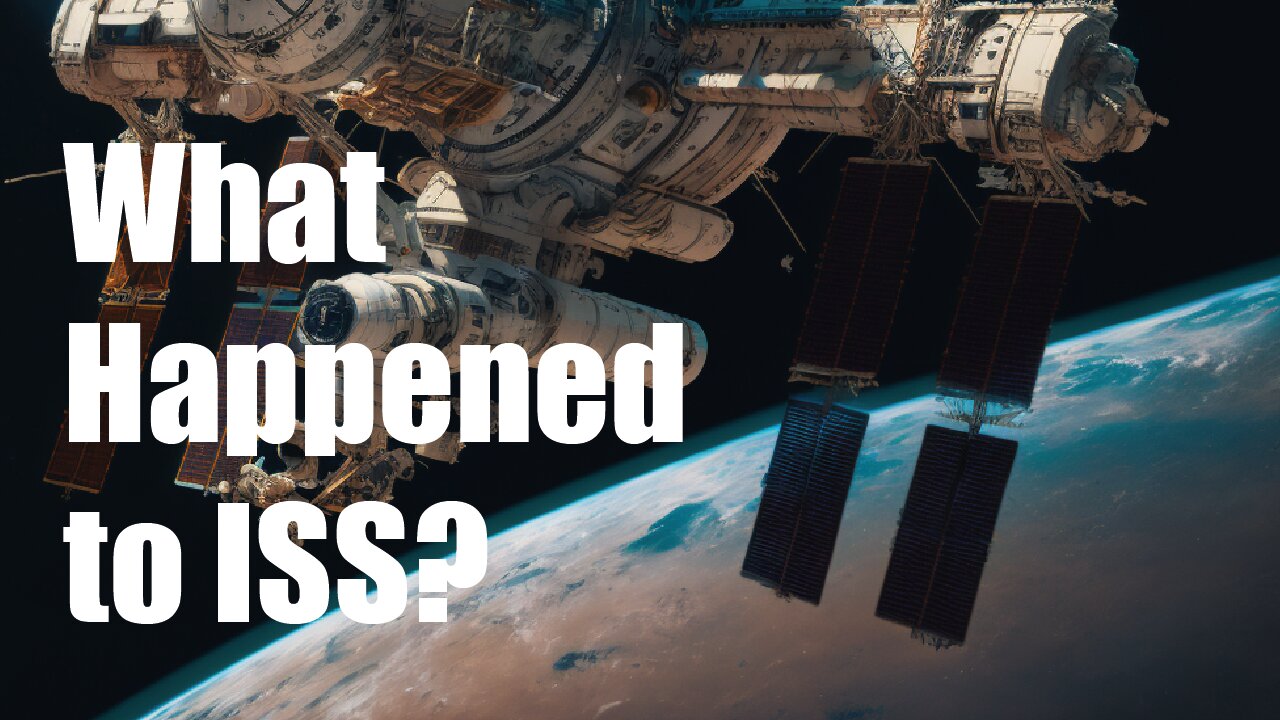Premium Only Content

What happened to the ISS?
The International Space Station (ISS) is a joint project among multiple space agencies and countries, including NASA (United States), Roscosmos (Russia), JAXA (Japan), ESA (Europe), and CSA (Canada). It is the largest and most complex space station ever built, and has been continuously occupied by crew members since 2000.
The ISS is a state-of-the-art research facility that enables scientists to conduct experiments in a variety of fields, including biology, Earth science, human research, material science, and more. It is also a platform for testing new technologies and conducting educational and outreach activities.
The ISS has a modular design and is made up of several pressurized modules that provide living and working spaces for the crew. It also has a number of solar panels that provide electricity, as well as a variety of external payloads and experiments that are mounted on its truss structure.
The ISS orbits Earth at an altitude of about 400 kilometers (250 miles), completing one orbit every 90 minutes. This means that the crew experiences 16 sunrises and sunsets every 24 hours, and they can see stunning views of Earth from the windows of the station.
Living and working on the ISS is a unique experience for crew members. They must adapt to living in a microgravity environment, which requires them to be physically and mentally fit. They also have to follow a strict schedule of work and leisure activities, and they must be able to work well as a team.
Another reason for the ISS is technology development. The ISS is a platform for testing new technologies and developing new capabilities for future space exploration. For example, researchers have used the ISS to test new propulsion systems, communications technologies, and life support systems. These technologies are not only important for future space missions, but they can also have practical applications on Earth, such as in the fields of transportation, healthcare, and environmental management.
The ISS is also a platform for educational and outreach activities. It serves as a unique opportunity for students and the public to engage with space exploration and learn about the scientific research being conducted on the station. This helps to inspire the next generation of scientists and explorers and promote public understanding of the importance of space research.
Finally, the ISS serves as a unique platform for international cooperation in space. It promotes peaceful cooperation and understanding among nations, and it is a testament to what can be achieved when nations work together towards a common goal.
Overall, the ISS is a vital component of the global space exploration program, and it continues to be an important platform for research, technology development, education, and international cooperation. Its contributions to science and technology have had a profound impact on our understanding of the universe, and it will continue to play a vital role in the future of space exploration.
The International Space Station (ISS) is currently in its second phase of operation, which is expected to last until at least 2030. During this phase, the ISS will continue to serve as a platform for scientific research, technology development, and international cooperation in space.
One of the main goals of the ISS during this phase is to continue conducting research that will benefit humanity and advance our understanding of the universe. This includes studying the effects of long-term exposure to microgravity on the human body, as well as examining the impacts of climate change and natural disasters on Earth's environment.
In addition to scientific research, the ISS will also continue to be a platform for technology development and testing. This includes developing new technologies for future space exploration, as well as testing new propulsion systems, communications technologies, and life support systems.
The ISS will also continue to serve as a platform for educational and outreach activities, including programs that engage students and the public in the excitement of space exploration.
Finally, the ISS will continue to be a symbol of international cooperation in space, promoting peaceful cooperation and understanding among nations.
Overall, the next phase of the ISS is expected to be an exciting time for space exploration, with many new discoveries and innovations on the horizon. The ISS will continue to be a vital component of the global space exploration program, and it will play a vital role in advancing our understanding of the universe and our place in it.
-
 1:08:36
1:08:36
Man in America
13 hours agoUS, China, Israel & the Battle for the New World Order w/ Boone Cutler
74.2K48 -
 2:37:49
2:37:49
The Connect: With Johnny Mitchell
1 day ago $7.48 earnedBlackwater Mercenary EXPOSES Private Military War Secrets From The Middle East, Fueling Terrorism
35K33 -
 2:54:21
2:54:21
Total Horse Channel
2 days ago2025 Scottsdale Arabian Horse Show | Saturday Evening Session
73.3K6 -
 22:39
22:39
The Mel K Show
9 hours agoMel K & Representative Brandon Gill | Our Constitutional Republic is Being Restored | 4-26-25
55.6K46 -
 4:17:17
4:17:17
VapinGamers
9 hours ago $4.95 earned📣 Fortnite Family Night! - Games and Dubs with BrianZGame - !rumbot
44.1K3 -
 4:27:48
4:27:48
ThePope_Live
7 hours agoLIVE - First time playing The Finals in over a YEAR! Still good? with @Arrowthorn
34K1 -
 3:06:26
3:06:26
TruthStream with Joe and Scott
13 hours agoRoundtable with Patriot Underground and News Treason Live 4/26 5pm pacific 8pm Eastern
56.1K34 -
 8:52
8:52
Tundra Tactical
11 hours ago $10.02 earnedSCOTUS Denies Appeal, Minnesota Courts Deal 2a Win!
55.5K11 -
 10:36:01
10:36:01
a12cat34dog
13 hours agoONE WITH THE DARK & SHADOWS :: The Elder Scrolls IV: Oblivion Remastered :: FIRST-TIME PLAYING {18+}
77K6 -
 22:27
22:27
Exploring With Nug
20 hours ago $12.87 earnedSwamp Yields a Chilling Discovery in 40-Year Search for Missing Man!
67.9K17